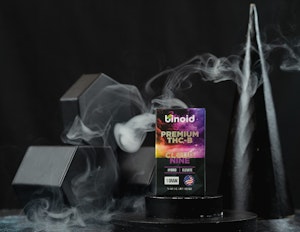
Photo by Mouthwash Studios
What Is THCH and Why Is Everyone Talking About It in 2025?
THCH is a potent compound gaining traction in the alternative-cannabinoid market.
What is THCH, and why is everyone suddenly talking about it? This lab-made cannabinoid is showing up in vapes, edibles, and tinctures across the U.S., promising a high that some claim is stronger than THC.
Its rise in 2025 reflects a bigger trend: more consumers are turning to hemp-derived cannabinoids that push past Delta-8 or Delta-9 in potency, especially in states where traditional cannabis is still restricted.
But as with most new cannabinoids, there’s a lot we still don’t know about THCH, including how safe it is and how it compares to the cannabinoids naturally found in the cannabis plant.
Key Takeaways

Herb
- THCH is a lab-made cannabinoid synthesized from hemp-derived CBD or other base cannabinoids.
- It produces intense psychoactive effects and is often synthesized from hemp extract for commercial production.
- THCH became popular in 2025 due to legal loopholes around hemp-derived psychoactive cannabinoids.
- Early consumer reports suggest THCH may offer powerful effects at small doses, but safety data is lacking.
- THCH is legal under federal law but may be restricted in some states.
- THCH products include vapes, tinctures, and edibles, but flower is not available.
What Is the THCH Cannabinoid?

Elsa Olofsson / unsplash
What is THCH? It stands for tetrahydrocannabihexol, a synthetic cannabinoid made from hemp-derived compounds like CBD. It’s not found in the cannabis plant and doesn’t occur naturally. The cannabinoid was first identified in 2020 by Italian researchers during a chemical analysis of cannabis extracts.
However, the THCH found in commercial products is made through more complex chemical processes, beginning with a chemical reaction that converts other cannabinoids into a new compound.
Structurally, THCH is similar to the THC molecule, but there’s one key difference. THCH has seven carbon atoms in its side chain instead of five. This may seem small, but different carbon chain lengths can affect how tightly the molecule binds to cannabinoid receptors, especially CB1.
That change in chemical structure is believed to influence its psychoactive properties, and it could be part of why users say the THCH high feels stronger or hits faster than Delta-9 THC. There’s no clinical research confirming this yet, but it helps explain why THCH is now showing up in more vapes, edibles, and tinctures made from hemp-derived cannabinoids.
Why THCH Became Popular in 2025
THCH rose to popularity as consumers searched for legal psychoactive compounds that fall outside traditional cannabis laws. Like Delta-8, THCH, and THCP, THCH is derived from hemp, which makes it federally legal under the 2018 Farm Bill, so long as the final product contains less than 0.3% Delta-9 THC.
Because of this legal gray area, THCH has become a go-to option for consumers seeking potent effects in places where regulated cannabis isn’t accessible. This trend reflects a broader shift toward hemp-derived cannabinoids, driven by consumer curiosity, regulatory loopholes, and the desire to produce psychoactive effects legally. Its rise also shows how quickly the cannabis industry adapts when there’s a regulatory gap and a new cannabinoid with potential therapeutic benefits.
Does THCH Make You Feel High? THCH Effects Explained

Unsplash
Yes, THCH gets you high. Most describe the THCH high as intense, with a fast onset and heavier impact than Delta-9, even at lower doses. Some say it feels similar to THCP, which makes sense given their structural similarities. Both cannabinoids feature longer carbon chains than Delta-9 THC, which can influence how they interact with CB1 receptors and contribute to their psychoactive properties.
Reported THCH Effects
- Euphoria and mental elevation
- Heightened sensory perception
- Creative stimulation
- Increased appetite
- Possible pain relief or analgesic properties
Possible Side Effects
- Drowsiness
- Dry mouth
- Red eyes
- Anxiety or paranoia at high doses
- Rapid heart rate or overstimulation
The potent cannabinoid profile of THCH makes it important to start with small doses and monitor how your body reacts. There’s still little scientific data on its exact mechanism, making both the potential benefits and psychological effects hard to predict.
THCH Compared to Other Cannabinoids

Elsa Olofsson / unsplash
THCH sits in a growing category of synthesized, hemp-derived cannabinoids that are designed to mimic or intensify the effects of naturally occurring THC. But how does it compare to compounds like Delta-9 THC, THCA, or THCP in terms of potency, legality, product type, and overall experience? Below is a breakdown of how the THCH cannabinoid stacks up against these other cannabinoids.
THCH vs. THC
- THCH is a synthetic substance, while THC is naturally occurring in the cannabis plant.
- THCH has a seven-carbon chain, compared to THC’s five; this may explain its stronger binding affinity to CB1 receptors.
- THCH may produce more intense psychoactive effects, but lacks formal research.
- THC is regulated and available in licensed dispensaries; THCH exists in a legal gray area and is typically sold online.
- When comparing THCH vs THC, it often comes down to potency vs. predictability.
THCH vs. THCA
- THCA is non-psychoactive unless heated (decarboxylated); THCH is psychoactive in its final form.
- THCA is found in raw cannabis; THCH is synthesized from hemp-derived cannabinoids.
- Unheated THCA is often used for its anti-inflammatory properties and other therapeutic potential.
- THCH is more associated with recreational use, as is heated THCA.
- THCH is typically sold as distillate in vapes, edibles, or tinctures; THCA is usually available as flower or in raw extract form.
THCH vs. THCP
- Both are lab-made cannabinoids with seven-carbon side chains, contributing to strong psychoactive effects.
- THCP may be slightly more potent, but THCH is becoming more common in retail products like vape cartridges and gummies.
- THCP has gained more attention in cannabinoid research, while THCH remains less studied.
- Both are part of the rise in hemp-derived cannabinoids that go beyond Delta-9 THC in strength and novelty.
Is THCH Legal in 2025?

Herb
Is THCH legal? Federally, yes, if it’s made from hemp and contains less than 0.3% Delta-9 THC by dry weight. That places it in the same category as other hemp-derived cannabinoids under the 2018 Farm Bill.
But state and local laws are catching up. Several states have banned or restricted synthetic cannabinoids like THCH, citing safety concerns and lack of regulation. THCH is not approved by the FDA and doesn’t follow the same production standards as regulated cannabis products. It sits in a legal gray area, and consumers should always check the legal status in their area before buying THCH products.
Is THCH Safe?

chelsea shapouri / Unsplash
We don’t have the research yet to say either way. THCH is a fully synthetic compound with no long-term data, no clinical studies, and no toxicology reports. While it’s similar to THC or THCP on a chemical structure level, that doesn’t mean it behaves the same in the human body.
There’s also no research confirming how THCH impacts the body’s endocannabinoid system. Some users report strong effects in small doses, which could be overwhelming for those with lower THC tolerance. Until we know more, it’s smart to approach THCH carefully, especially if you’re prone to anxiety or sensitive to psychoactive compounds and their potential adverse effects.
Buying THCH Products
The cannabis plant doesn’t naturally produce THCH in usable amounts, so THCH flower can be uncommon. Some brands do offer “THCH flower” by spraying hemp buds with THCH distillate. It’s not the same as naturally occurring cannabinoid-rich flower, and the effects can vary depending on the quality of the base hemp and how evenly the distillate is applied.
If you’re shopping for THCH flower, keep in mind that you’re really consuming a cannabis extract sprayed onto a smokable product, not a plant that naturally contains THCH.
Common THCH products on the market include:
- THCH Edibles – Long-lasting, delayed onset, commonly sold in gummy form.
- THCH Vapes – Fast onset, often blended with Delta-8, HHC, or other cannabinoids.
- Product Spotlight: Binoid THCH Vape Cartridge – Death Star
This THCH vape cart from Binoid contains a blend of THCH distillate and other cannabinoids in the popular Death Star strain. Known for its gassy aroma and deep body effects, this cartridge delivers potent relaxation and psychoactivity.
- Product Spotlight: Binoid THCH Vape Cartridge – Death Star
- THCH Tinctures – Sublingual oil drops with moderate onset and longer duration.
What to Look for in THCH Products

Herb
Green flags:
- Independent, third-party lab testing
- Clear cannabinoid percentages and ingredients
- Traceable batch numbers and certificates of analysis
Red flags:
- No lab results or vague testing claims
- Extremely cheap pricing or mislabeled products
- Harsh additives or unknown synthetic carriers
Final Thoughts

Zig Zag
THCH is a cannabinoid that appeared quickly and leaves a lot of unanswered questions behind it. It’s potent, synthetically made, and legally murky. However, this hasn’t stopped brands from pushing it into various forms, including carts, gummies, and tinctures. There’s no solid research yet, just early reports and some bold claims.
If you’re curious about what THCH is and whether it’s worth trying, start with a low dose, check the lab results, and make sure you’re getting it from a reputable source. Until we have real research on how this cannabinoid works in the body, the safest move is still the simplest: take it slow and stay informed.
Herb Recommended Products:
READ MORE











